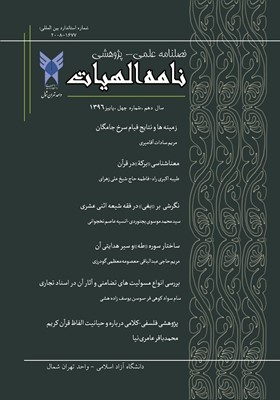فرهنگ سازهای معیشتی در قرآن کریم
محورهای موضوعی : نامه الهیاتمحسن شهیدی 1 , مریم حاجی عبدالباقی 2 * , سید محسن میرباقری 3
1 - گروه علوم قرآن و حدیث، واحد تهران شمال، دانشگاه آزاد اسلامی، تهران، ایران
2 - گروه علوم قرآن و حدیث، واحد تهران شمال، دانشگاه آزاد اسلامی، تهران، ایران
3 - گروه علوم قرآن و حدیث، واحد تهران شمال، دانشگاه آزاد اسلامی، تهران، ایران؛ گروه علوم قرآن و حدیث، دانشگاه شهید رجایی، تهران، ایران.
کلید واژه: قرآن, معیشت, فرهنگ ساز, فرهنگ معیشت,
چکیده مقاله :
آشنایی با فرهنگ قرآنی در حوزه معیشت و انطباق نگرش و رفتار و اخلاق با آن امری ضروری و کاربردی است. مقاله پیش رو پژوهشی نظری است که به روش تحلیلی اکتشافی ، درصدد کشف فرهنگ سازهای معیشتی از آیات قرآن می باشد تا با بکارگیری آنها نیل به کسب و مصرف مورد پسند قرآن میسّر گردد . لذا در ابتدا مبانی و نوع نگرش قرآن به موضوع معیشت از جمله باور به رزّاقیت خدا و اعتماد به وعده های الهی ، آخرت گرایی و ترک دنیابسندگی ، نگرش صحیح به اموال و پذیرش سنّت ابتلاء مورد بررسی قرار گرفته و سپس به دلالت های رفتاری اخلاقی در فرهنگ معیشت از منظر قرآن پرداخته می شود که هر کدام به نوعی بیانگر فرهنگ صحیح معیشت می باشند. اولویت دهی به این عوامل و یافتن ساختار مولّفه های معیشتی با توجّه به وزن آیات قرآنی مربوطه از دستاوردهای این نوشتار می باشد.
Familiarity with Quranic culture in the field of livelihood and adapting attitudes, behaviors and ethics to it is necessary and practical. The present article is a theoretical research that seeks to discover the culture of livelihood instruments from the verses of the Qur'an through exploratory analytical methods in order to achieve the desired acquisition and consumption of the Qur'an. Therefore, first the principles and type of attitude of the Qur'an to the subject of livelihood, including belief in God's sustenance and trust in divine promises, heresy and abandonment of worldliness, correct attitude to property and acceptance of the tradition of affliction are examined and then the moral behavioral implications in The culture of livelihood is studied from the perspective of the Qur'an, each of which in some way expresses the correct culture of livelihood. Prioritizing these factors and finding the structure of livelihood components according to the weight of the relevant Quranic verses is one of the achievements of this article.
_||_

